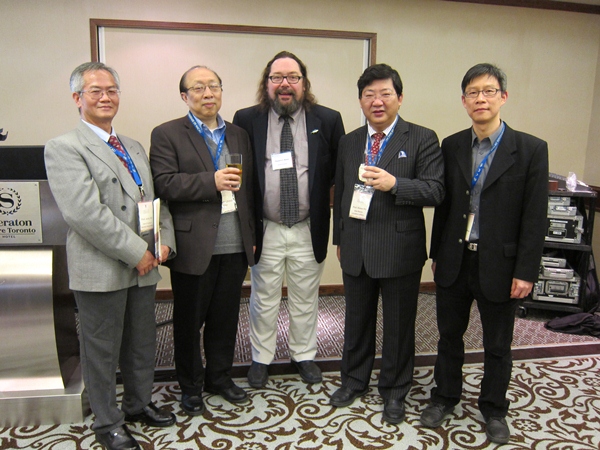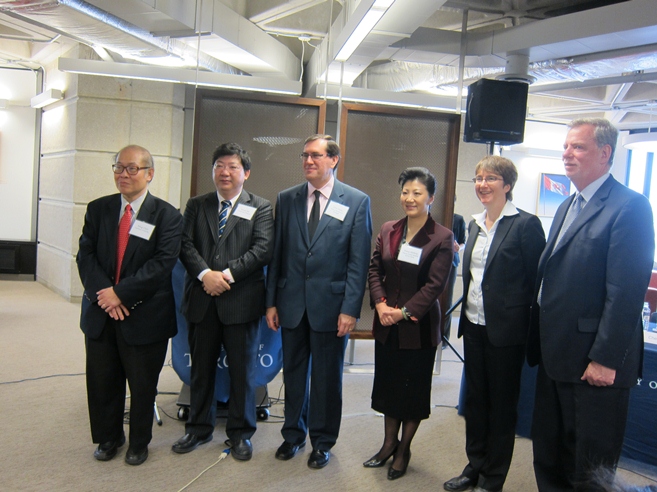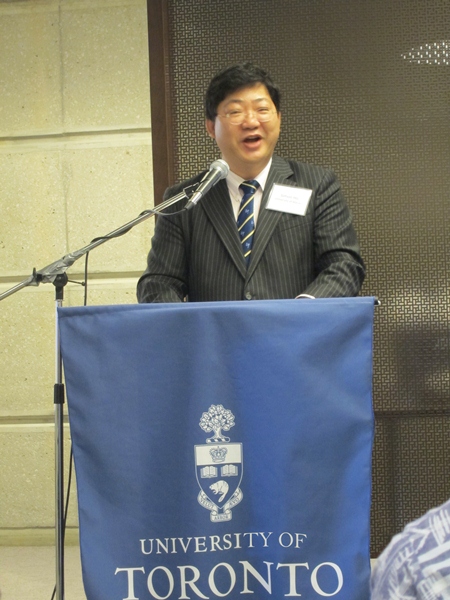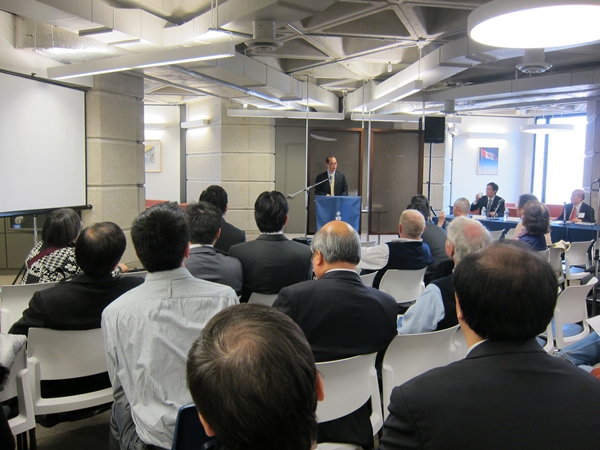The University of Macau—University of Toronto Joint Symposium on “China’s Macao SAR: 12 Years of Breakthrough & Transformation”, jointly organized by the University of Macau (UM) and the University of Toronto (UT), took place at UT on 19 March 2012. The symposium mainly discussed a wide range of topics, including “Overview of the Macao SAR’s First 12 Years”, “University of Macau Cross-Border New Campus as PRD Integration Breakthrough”, “Macao SAR Governance & Economy”, “Macao SAR Identity, Culture & Heritage” and “Macao SAR/Macanese External Links”.
Deputy Consul General of the People’s Republic of China in Toronto Zhang Meifang, Consul General of Portugal in Toronto Júlio Vilela, UM Vice Rector Simon Ho, and UT Vice-President and Provost Cheryl Misak attended the symposium and delivered speeches.
Zhang Meifang noted that thanks to the “one country, two systems” policy and a high degree of autonomy reflected in “Macao people governing Macao”, Macao has made fast progress in economy, people’s well-being and cultural causes since its return to China, with ever-increasing international ties and influence. She added that the central government attaches great importance to the development of Macao and has implemented a series of policies in support of the economic development of Macao and the well-being of Macao residents, bringing more opportunities and greater space for Macao’s long-term development. She expressed her confidence that with the strong support of the motherland and the unrelenting efforts of Macao compatriots, Macao is sure to create an even better future.
Júlio Vilela stressed that in view of the present world situation, the existing partnership between China and Portugal, as reflected in the numerous cooperation agreements on culture, science and technology, tourism, electronics, telecommunications, and economy, has become extremely important for both countries. Júlio Vilela noted that as the headquarters for the Forum for Economic and Trade Cooperation between China and Portuguese-speaking Countries, Macao serves a unique role as a bridge.
In his speech, Simon Ho mentioned that this was the first symposium co-organized by UM in North America, and represented the first step towards establishing a bridge of communication and cooperation between UM and top universities in Canada. Simon Ho voiced his hope that this symposium could offer an opportunity for UM to promote to North America and the world its educational philosophy and the new opportunities brought by the new campus, and also to strengthen ties between UM and UT to enhance mutual understanding and cooperation. He stressed that UM is about to enter a new era; and with the support of the Macao SAR government, a new campus will be built by the end of this year, and when that happens, UM will have far better facilities for teaching and research. He added that on the new campus UM will establish more academic units and research projects, and will introduce residential colleges in order to make the campus a living-and-learning community for students. Simon Ho added that Macao has a rich Chinese cultural heritage and Euro-continental traditions, serves as a bridge of communication between China and the world, and enjoys extensive networks of international partnerships. He expressed confidence that with the unique cultural and geographical advantages of Macao, the great support of the Macao SAR government, and the continuous efforts of all UM members, the goal of developing UM into a world-class university with regional characteristics can one day be achieved.
In her welcome remarks, UT Vice-President and Provost Cheryl Misak said that Macao is similar to Toronto as an ethnically and culturally diverse pluralistic community characterized by tolerance and harmony. She added that this symposium enabled Toronto to learn more about Macao society. She also thanked relevant organizations involved in this symposium for their efforts.
At the opening ceremony, UM donated books to UT Libraries. A total of twenty-three experts and scholars from around the world presented academic reports at the symposium. Attendees first discussed the topic of “Overview of the Macao SAR’s First 12 Years”, and then exchanged ideas on “University of Macau Cross-Border New Campus as PRD Integration Breakthrough”. Attendees also held in-depth discussions on “Macao SAR Governance & Economy”, “Macao SAR Identity, Culture & Heritage” and “Macao SAR/Macanese External Links”. UM scholars present at the symposium included Lam Ming Ki, Hao Zhidong, Chou Kwok Ping, Lam Iok Fong, Yu Wing Yat, Ho Chiew Siang, Zhang Yang, Ngo Tak-Wing, Choi Kai Yan, and Antonio Saldanha. Ming Chan from Stanford University, and Rufino Ramos from the International Institute of Macau also attended the symposium.
On the occasion of the annual conference of the Association for Asian Studies, which was held in Toronto from 15 March to 18 March, UM Rector Wei Zhao and Vice Rector Simon Ho held a reception for over three hundred and fifty guests from around the world, enabling them to have a better understanding of Macao and UM.
For enquiries, please contact Ms. Kay Lai at(853)8397 4325 or kaylai@um.edu.mo, or visit www.umac.mo.




